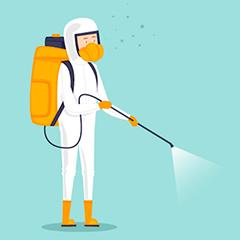Pesticides
Pesticides are substances we use to control or kill pests. Pests can be weeds, insects, rodents, or bacteria — anything we don’t want to have around.
Sometimes pesticides work too well. They may not only harm the intended pest but also other plants, animals, and people. Sometimes they end up in places we don’t want them to be — for example, in our air, water, and food.
How can people be exposed to pesticides?
People can be exposed to (come in contact with) pesticides by touching, swallowing, or inhaling (breathing) them.
How can pesticides affect my health?
Symptoms of pesticide exposure can vary depending on:
- How long you’re exposed to pesticides
- How much pesticide gets into your body
- How the pesticide gets into your body
- Tobacco smoke
- What kind of pesticide you encounter
Exposure to pesticides can cause a range of health issues, including:
- Damage to the endocrine system (the system that controls hormones, or the chemicals that regulate metabolism)
- Damage to the nervous system
- Irritation of skin and the eyes
Some content courtesy of the National Library of Medicine.


